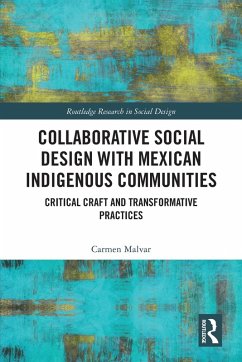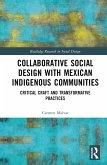This book builds on the work of anthropologists, designers, and ethnographers to develop an original methodology and framework for indigenous engagement and designer/non-designer collaboration in the field of social design.
Following a collaborative case study conducted over a five-year period between the author, project team, and indigenous artisans in Mexico, the book outlines the practical challenges of design research, including funding, logistics, relationships between designers and communities, failures, successes, and pivots. Social design literature has often focused on introducing important questions to the design research process, but fails to deeply interrogate and demonstrate how these theories inform research projects in action, which can then be open to misinterpretation, bias, and unintended harmful consequences. Centering the indigenous communities, this book provides a detailed and clear example of not just why, but how design and designers canwork authentically and responsibly through different approaches and systems. The book examines the specific cultural, epistemological and socio-political history of Mexico as it relates to colonization and indigenous peoples, exploring the systemic influences of globalization and grounding the research in its unique context. It includes field notes, conversations with the indigenous artisan communities, workshops and prototypes to offer unique insight into a detailed, collaborative social design initiative.
This book intersects with the growing awareness of the necessity of decolonial approaches to design across the world and will be an important and useful study for academics, students and researchers in social design, sustainable development, cultural studies and anthropology.
Following a collaborative case study conducted over a five-year period between the author, project team, and indigenous artisans in Mexico, the book outlines the practical challenges of design research, including funding, logistics, relationships between designers and communities, failures, successes, and pivots. Social design literature has often focused on introducing important questions to the design research process, but fails to deeply interrogate and demonstrate how these theories inform research projects in action, which can then be open to misinterpretation, bias, and unintended harmful consequences. Centering the indigenous communities, this book provides a detailed and clear example of not just why, but how design and designers canwork authentically and responsibly through different approaches and systems. The book examines the specific cultural, epistemological and socio-political history of Mexico as it relates to colonization and indigenous peoples, exploring the systemic influences of globalization and grounding the research in its unique context. It includes field notes, conversations with the indigenous artisan communities, workshops and prototypes to offer unique insight into a detailed, collaborative social design initiative.
This book intersects with the growing awareness of the necessity of decolonial approaches to design across the world and will be an important and useful study for academics, students and researchers in social design, sustainable development, cultural studies and anthropology.








